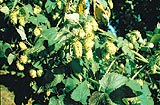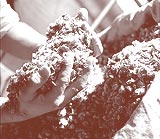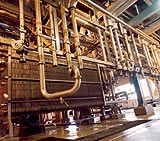Brewing of Beer
 Turning
water into beer is something of a miracle to many but to brewers it is the gospel
of science and inspiration. The twin disciplines of creativity and technology
come together in a unique harmony to produce a liquid that has been a way of
life almost since time began.
Turning
water into beer is something of a miracle to many but to brewers it is the gospel
of science and inspiration. The twin disciplines of creativity and technology
come together in a unique harmony to produce a liquid that has been a way of
life almost since time began.
The general principles and ingredients are similar but
each brewer has a set of rules and interpretations that allow beer to be brewed
to all tastes around the world. Beer has a special place in history and culture
and it is fitting that centuries of research have been used in search of the
perfect brew. The most interesting and challenging part of brewing is getting
the best from natural raw materials and making sure the process provides a consistent
high quality. Successful brewers have proven that imagination and an understanding
of the qualities of water, yeast, malt and barley are essential to getting a
final product that tastes good every time. That sort of triumph does not happen
overnight, nor can it be done by remote control. Enter any good brewery and
you will find a modern, computerised production system. But you will also discover
a workforce with a passion and deep respect for the art of brewing.
Hopping about
 Beer
is a universally accepted drink but to many the journey from a pile of basic
materials to a clean, refreshing drink remains a mystery. The first consideration
is the water. Beer is made up of 90 per cent water so its quality and taste
are crucial. Local geography dictates what minerals are present and, as they
can change almost daily, the job of getting a consistent product is more difficult.
In the past the taste of a beer could change alarmingly from one barrel to the
next. But most breweries now have their own water filtration plants where the
composition is meticulously monitored.
Beer
is a universally accepted drink but to many the journey from a pile of basic
materials to a clean, refreshing drink remains a mystery. The first consideration
is the water. Beer is made up of 90 per cent water so its quality and taste
are crucial. Local geography dictates what minerals are present and, as they
can change almost daily, the job of getting a consistent product is more difficult.
In the past the taste of a beer could change alarmingly from one barrel to the
next. But most breweries now have their own water filtration plants where the
composition is meticulously monitored.
Hops are plants that are used almost exclusively
for brewing. They provide a beer with its distinct bitter taste and aroma. For
anyone who thinks that brewing is a male preserve, they may like to know that
only the female hop plant is used. Freshly picked hops are dried and then bundled
ready for the brewery.
Critical Malt
 Selecting
the right barley for the malting process is again essential. The crop is cleaned,
soaked and then spread out so it can germinate. It is then dried by warm air
and the temperature can determine the beer’s colour and sharpness. The
malted barley rests for three weeks before it is ready.
Selecting
the right barley for the malting process is again essential. The crop is cleaned,
soaked and then spread out so it can germinate. It is then dried by warm air
and the temperature can determine the beer’s colour and sharpness. The
malted barley rests for three weeks before it is ready.
The most interesting ingredient is yeast. It is a
single-celled fungus, which sounds like the last thing you would want in your
beer. But it has a unique capacity to convert sugars into alcohol and carbon
dioxide. Brewers attach great importance to getting the right yeast and most
have research laboratories where different yeasts are monitored. Heineken even
hired a student of the great scientist Louis Pasteur to work on its yeast. Painstaking
work produced the A-yeast more than 100 years ago, which is a cornerstone of
the company’s successful brewing empire. What brewers do with the hops,
malted barley, yeast and water is a closely-guarded secret but a trip through
the brewing process gives an idea how much time and effort is needed.
The first job is to mill the malt so its qualities
can be released in the process called mashing where it is mixed with warm water.
Its natural enzymes break down the sugar and protein in the malt.
Working Yeast
 This
produces a sugar-rich fluid called the wort, which is then boiled. The hops
are added and the liquid cooled. It is now time for the yeast to go to work
- the all-important fermenting period. It breaks down the sugar into alcohol
and carbon dioxide, which gives beer a natural sparkle. After a week, the yeast
is removed and the ‘young beer’ is cooled and pumped into conditioning
tanks in the cellar where filtration and lagering take place over a number of
weeks at low temperatures.
This
produces a sugar-rich fluid called the wort, which is then boiled. The hops
are added and the liquid cooled. It is now time for the yeast to go to work
- the all-important fermenting period. It breaks down the sugar into alcohol
and carbon dioxide, which gives beer a natural sparkle. After a week, the yeast
is removed and the ‘young beer’ is cooled and pumped into conditioning
tanks in the cellar where filtration and lagering take place over a number of
weeks at low temperatures.
It is then ready to be put into bottles, kegs and
cans. It is a tried and tested routine but with every ingredient having its
own signature, care and attention are needed at every stage. The slightest deviation
can alter the final taste so the amounts of each material, the temperatures
and the timing have to be performed with unrelenting efficiency. An example
of that is provided by Dini Bouwmeester, Heineken's production manager brewing,
at its Zoeterwoude brewery in the Netherlands, the biggest in Europe. She says:
"The ingredients of beer are natural products which can be dependent on
climate so Heineken has the necessary technical expertise to ensure that premium
beer is produced every time".
Brewing is automated and computerised but it is still
a natural process that can change from time to time. Our staff check samples
regularly and their senses of aroma and taste are still important. I have visited
around 70 per cent of our breweries around the world and it is a source of pride
that we can produce consistent beers no matter the local circumstances. You
can call brewing an art, a science or even a miracle but millions of people
around the globe taste the benefit every day.
 Turning
water into beer is something of a miracle to many but to brewers it is the gospel
of science and inspiration. The twin disciplines of creativity and technology
come together in a unique harmony to produce a liquid that has been a way of
life almost since time began.
Turning
water into beer is something of a miracle to many but to brewers it is the gospel
of science and inspiration. The twin disciplines of creativity and technology
come together in a unique harmony to produce a liquid that has been a way of
life almost since time began.

